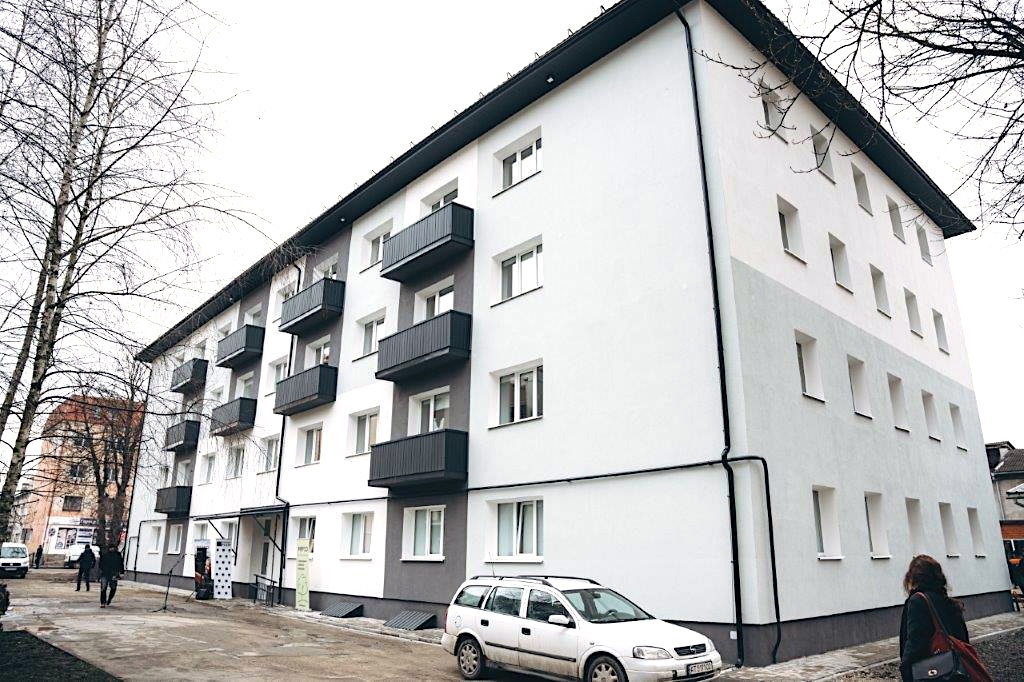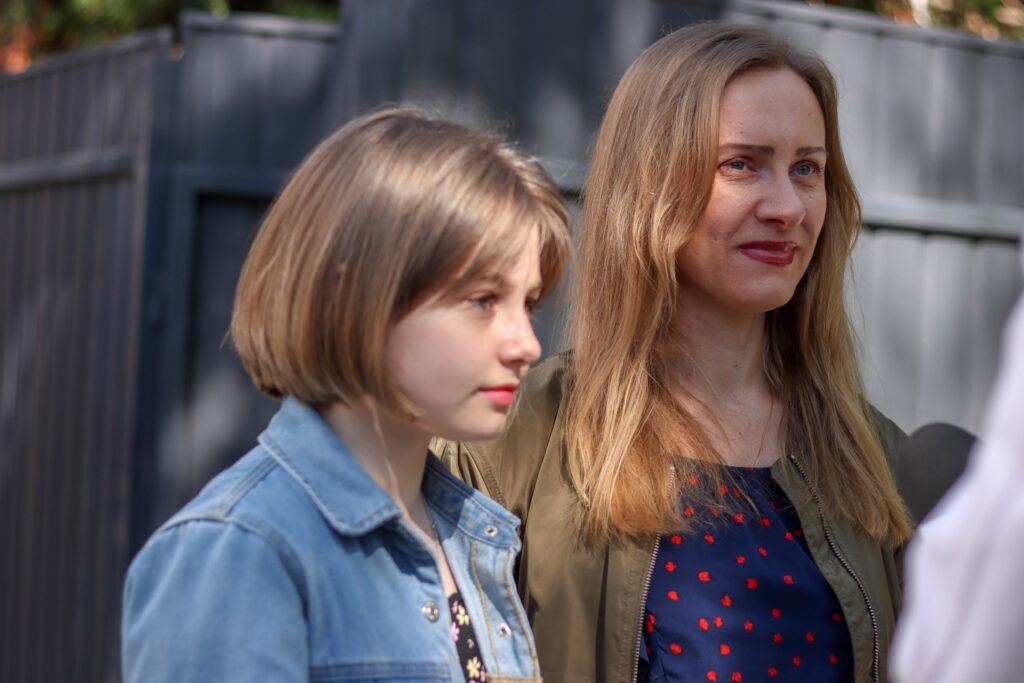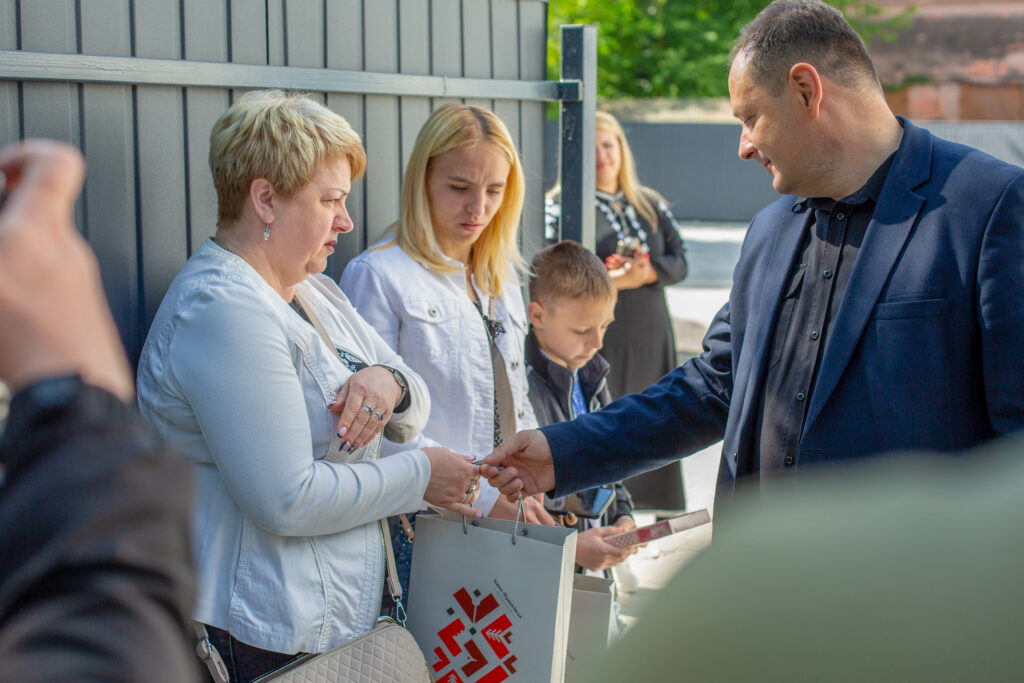06.06.2024 | People
Ivano-Frankivsk is a large regional centre in western Ukraine with around 240,000 inhabitants. Due to its distance from active hostilities, the city has become a major hub for those fleeing the war and now hosts approximately 41,000 IDPs in dire need of safe and quality housing.
Читати історію українською мовою
- A university dormitory and an administrative building in Ivano-Frankivsk were reconstructed into energy-efficient social housing for IDPs under the “EU Support for Urgent Housing Needs for Internally Displaced Persons (IDPs) in Ukraine” programme, funded by the European Union and managed by Nefco.
- With a total project budget of EUR 2.2 million, the overhauled dormitory is now capable of accommodating 150 IDPs, while the administrative building can host 40 residents.
- Two residents of the IDP housing, Alla and Halyna, talk about their escape from Russian aggression, share impressions of the new apartments, and express their hopes for Ukraine’s revival.
To help relieve the pressure on the city’s infrastructure to accommodate newcomers, a university dormitory and an administrative building in Ivano-Frankivsk were reconstructed into energy-efficient social housing for IDPs under the “EU Support for Urgent Housing Needs for Internally Displaced Persons (IDPs) in Ukraine” programme, funded by the European Union and managed by Nefco.
“Our city has a long history of fruitful cooperation with Nefco. Prior to the war, thanks to Nefco, dozens of educational institutions in Ivano-Frankivsk were thermomodernised and equipped with updated heating systems. In 2022, Ivano-Frankivsk received grant funding to develop social housing. We are grateful to the European Union for supporting Ukraine and enabling us to create homes for people who were forced to move to Ivano-Frankivsk from the war zone and are expected to remain in the city on a long-term basis,” said Ruslan Martsinkiv, Mayor of Ivano-Frankivsk.

Under a budget of EUR 2.2 million, the facilities underwent significant reconstruction using modern energy-efficient solutions. In the dormitory, the heating system was replaced with the installation of an individual heating substation; the facade and attic were insulated; the roof was repaired; and interior finishings were completed. Additionally, a solar power station for electricity supply was installed, and water supply, sewage and ventilation duct systems were modernised.
The administrative building gained an additional floor and a new roof. Furthermore, an individual heating substation, a fire alarm system, and thermal insulation were installed; utilities were connected; and the facade was renovated. The housing units were equipped with all the necessary furniture, household appliances, kitchen utensils, and bedroom accessories. As a result, the overhauled dormitory can now accommodate 150 IDPs, while the administrative building can host 40 residents.
Here, two residents of the IDP housing, Alla and Halyna, talk about their escape from Russian aggression, share impressions of the new apartments, and express their hopes for Ukraine’s revival.

Alla fled to Ivano-Frankivsk from Mariupol with her mother and daughter, while her husband stayed in the Donetsk region to join the army. The family has already settled in, and Alla found employment in the new city. “My child attends a local school, while I work in the support centre for internally displaced people from Mariupol,” she shares. “In my free time, I weave camouflage nets for the military.”
Grateful to the sponsors of the project, Alla envisages a brighter future for Ukraine. “I strongly support the construction of social housing. Such initiatives are extremely important and timely because many people have lost their homes, and only a few will be able to return. However, there is always hope. I wish that Ukraine will free its territories and rebuild its cities so that all families can finally reunite.”

Halyna, originally from the Melitopol district of the Zaporizhzhia region, also received keys to a new apartment. After enduring nearly seven months under Russian occupation, her family decided to leave, concerned about the safety of their children. Upon arrival, they found Ivano-Frankivsk to their liking. “It’s a beautiful, homely city with kind and friendly people,” says Halyna. “We never travelled anywhere before, so I couldn’t even imagine that I would like it so much.”
With Halyna’s older children determined to stay in Ivano-Frankivsk long-term, the new apartment provides her with a sense of stability. “The apartment is nicely furnished and has everything you need. I am deeply grateful to the European Union for supporting Ukraine.”
Despite finding a comfortable refuge in a new apartment, Halyna’s family hopes that their hometown will be rebuilt. “While children are slowly settling down here, my husband and I would really like to return. Ivano-Frankivsk is a wonderful city, but we were born and grew up back there, and it is our home.”
“The EU is delighted to see how the Ivano-Frankivsk project has transformed the lives of displaced Ukrainians while at the same time contributing to the country’s green transformation and energy transition,” says Jocelin Cornet, Head of Reconstruction, Energy, Infrastructure and Environment Section of the EU Delegation to Ukraine. “We stand with Ukraine in addressing war-related humanitarian needs and ensuring that affected individuals have a dignified living space to rebuild their lives.”
“The reconstruction and energy-efficient modernisation of social housing in Ivano-Frankivsk are not only means to organise comfortable living arrangements for internally displaced persons; they are also contributing to strengthening Ukraine’s energy resilience and independence,” says Ronny Nilsson, Senior Adviser at Nefco. “We are glad to assist local municipalities in accommodating newcomers from war-torn regions while making a lasting impact on Ukraine’s future as a green and sustainable country.”
The reconstruction of housing for IDPs in Ivano-Frankivsk was implemented under the “EU Support for Urgent Housing Needs for Internally Displaced Persons in Ukraine” action, funded by the European Union and managed by Nefco. The initiative aims to provide accommodation for Ukrainian citizens forced to flee their homes due to Russia’s armed aggression in ten cities across western and central Ukraine, including Kivertsi, Chernivtsi, Chortkiv, Ivano-Frankivsk, Khmelnytskyi, Kovel, Lutsk, Rivne, Zolochiv, and Zviahel.
For further information, please contact:
Ronny Nilsson, Senior Adviser, Nefco
ronny.nilsson@nefco.int,+358 10 618 0642
Andriy Katashov, Technical Adviser, Nefco
A.Katashov@nefco.org.ua, +380 96 299 65 70
About the Neighbourhood Investment Platform (NIP)
The Neighbourhood Investment Platform (NIP) is a mechanism aimed at mobilising additional funding to finance capital-intensive infrastructure projects in EU partner countries covered by the European Neighbourhood Policy (ENP) in sectors such as transport, energy, environment and social development. The NIP also supports the private sector, mainly through investment grants and risk capital operations targeting small and medium-sized enterprises. The NIP strives to pool grant resources from the EU budget and EU Member States and use them to leverage loans from European Financial Institutions as well as contributions from the ENP partner countries themselves. In this way, the EU backs its neighbours’ priorities and supports them in carrying out key investments and boosting economic development.